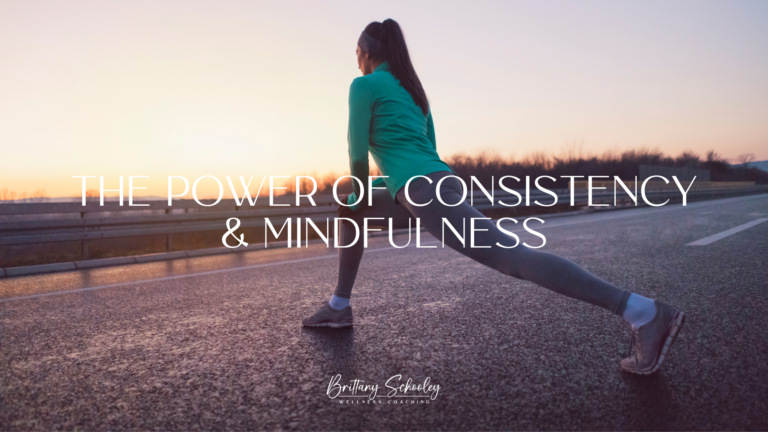
Harnessing the power of consistency and mindfulness for health
In the pursuit of health and wellness, the journey itself is what is really important, as there really is no such thing as a final destination. There will always be something else worth pursuing, improving, or accomplishing. So how do we hone in on the journey to ensure our efforts are worthwhile? Consistency and mindfulness.
Think about it. When was the last time you were successful at something? Did it happen overnight without any effort or practice? Or did you practice regularly and put regular thought into what it was you were doing?
Establishing and maintaining consistent health habits requires a mindful approach that intertwines the principles of routine, resilience, and environmental influence. Let’s look at how consistency and mindfulness converge to pave the way for lasting results on the road to a healthier life.
Building Consistent Habits
Consistency is the cornerstone of any successful health journey. When we talk about building consistent habits, we’re delving into the science of habit formation. Our brains are wired to seek routine and familiarity, making it crucial to establish habits that align with our health goals.
Creating a routine doesn’t mean drastic overhauls; it’s about small, sustainable changes that compound over time. Whether it’s adopting a regular exercise routine, prioritizing sleep, or incorporating nutrient-dense foods into your diet, consistency is key. Scientifically, habits are formed through repetition, and the more consistent the behavior, the more ingrained it becomes.
To build consistent habits effectively, start small. And I mean small. Choose one aspect of your health you want to improve and focus on it until it becomes second nature. Once that habit is established, gradually introduce additional changes. This incremental approach is not only more manageable but also enhances the likelihood of long-term success.
Overcoming Setbacks
No health journey is without its challenges. Unexpected setbacks can be discouraging, but they are an inevitable part of the process. This is where mindfulness becomes a powerful ally. Mindfulness involves cultivating awareness of the present moment without judgment, allowing us to respond to setbacks with resilience and self-compassion.
Rather than viewing setbacks as failures, approach them as opportunities for growth. Mindfulness teaches us to acknowledge and accept our present circumstances without dwelling on self-blame. By staying present and focused on the current moment, we can better understand the factors contributing to setbacks and make informed decisions on how to move forward.
Mindfulness techniques, such as meditation and deep breathing, can help calm the mind and provide clarity during challenging times. These practices create a mental space that allows for reflection and positive decision-making, enabling us to learn from setbacks rather than be defined by them.
Creating a Mindful Environment
Consistency and mindfulness extend beyond personal habits to our environments. Our surroundings play a significant role in shaping our behaviors and choices. Creating a mindful environment involves curating a space that supports, rather than hinders, our health goals.
Consider the physical and social aspects of your environment. Ensure your living space is conducive to healthy habits by organizing it in a way that promotes physical activity, relaxation, and healthy eating. Surround yourself with positive influences—friends, family, or a supportive community—that encourage and reinforce your commitment to health.
Minimize distractions and cultivate a mindful atmosphere during meals and exercise. Turn off electronic devices, savor each bite, and be fully present in the activity at hand. By consciously shaping your environment, you empower yourself to make choices aligned with your health goals.
You don’t need another gadget or fad, you need consistency and mindfulness.

Creating mindfulness around day-to-day activities is a powerful way to promote overall well-being and achieve health goals. Here are eight examples of how to incorporate mindfulness into your daily routine:
Practice Slow and Conscious Eating: Take the time to savor each bite, paying attention to flavors, textures, and aromas. Chew your food thoroughly and put your utensils down between bites to avoid rushing through meals.
Start the Day with Intention: Begin your morning with a few minutes of mindfulness. This could include deep breathing exercises, gentle stretching, or a short meditation session. Set positive intentions for the day ahead.
Focus on Each Step: Whether you’re walking to work or taking a stroll in nature, be present with each step. Feel the ground beneath your feet, notice your surroundings, and breathe deeply. Walking mindfully can be a form of active meditation.
Savor Your Beverages: Whether it’s a cup of tea, water, or a smoothie, take a moment to appreciate the act of hydrating. Feel the temperature, taste the flavors, and be grateful for the nourishment your drink provides.
Pause and Reset: Throughout your workday, take short breaks to reset your mind. Step away from your desk, close your eyes, and take a few deep breaths. This simple practice can enhance focus and reduce stress.
Set Tech Boundaries: Be conscious of your screen time. Set specific periods for checking emails and social media and consider implementing tech-free zones or times during the day to promote mental clarity.
Reflect on Your Day: Before bed, take a few minutes to reflect on the events of the day. Consider what went well, what you learned, and acknowledge any challenges without judgment. This reflection can help you unwind and prepare for a restful night’s sleep.
Practice Deep Breathing: Incorporate moments of deep breathing into your day. Whether you’re at your desk, in the car, or waiting in line, take a few mindful breaths. Focus on the sensation of the breath entering and leaving your body.
Remember, mindfulness is about being fully present in the moment without judgment. These practices can be adapted to your personal preferences and schedule. Consistently integrating mindfulness into your daily activities can lead to improved focus, reduced stress, and a greater sense of overall well-being, contributing to the achievement of your health goals.
In today’s rush, we all think too much — seek too much — want too much — and forget about the joy of just being.
– Eckhart Tolle

Welcome to Everything Wellness! I’m Brittany, a Functional Medicine Certified Health Coach on a mission to help you feel alive and achieve your ideal vision of health! I help people get back on track through 1:1 wellness coaching, sharing my personal experiences with health struggles, and educating on the importance of lifestyle medicine.
Wellness Coaching
A client-centered approach to holistic wellness through lifestyle modification and behavior change.
Functional Medicine
A form of alternative medicine that focuses on identifying and addressing the root cause of disease.
